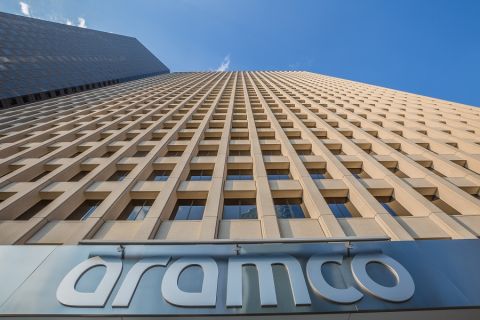Joking that the company has been "very busy with inorganic growth," BP Amoco Plc regional president David F. Work recently outlined his 2000 U.S. plans for the London multinational oil company. Work, a geologist with predecessors to BP Amoco since 1970, is responsible for BP Amoco exploration and production in the Lower 48 states, onshore and offshore, and for some, but not all, of the company's U.S. refining assets. Work explained the mammoth company's new structure. There are 130 business units worldwide, each carrying $1- to $1.5 billion in assets. These self-contained units report to the highest level in London headquarters. Nine are based in Houston: four offshore units, the Rocky Mountain and Midcontinent regions, the Altura Energy (Permian Basin oil) joint venture with Shell Oil Co., natural gas marketing and transportation, and the global power group. His remarks to the Houston Producers' Forum came just before the Federal Trade Commission decided, 3-2, to sue to block BP Amoco's next merger-with multinational Atlantic Richfield Co., another U.S. major. Work said that several factors drove Amoco, the fifth-largest major U.S. oil company at the time, to combine with BP. "One reason we merged was to move our finding, development and lifting costs to below $7 per barrel, and to be successful in a world of $10 oil," he explained. "There also was demand from shareholders and Wall Street to increase our returns. But initiation of this event matters less than the execution of it." The challenge this year, according to Work, is to "make all these pieces mesh into a successful enterprise, identify the criteria that will lead us forward and sell the assets that are too capital or people-intensive. BP Amoco plans to sell about $10 billion of assets during the next three years." It soon will announce the multibillion-dollar sale of its Altura interest. The data room is closed and final bids are being evaluated, Work said. The company plans to spend some $5 billion to accelerate development of its Crazy Horse Field, a billion-barrel discovery in the deepwater Gulf of Mexico that was announced last July. In Alaska, the company wants to exploit the 30 trillion cubic feet of gas found on the North Slope. A $50-million gas-to-liquids pilot plant will be built there in partnership with Exxon Mobil Corp. BP Amoco now has an approximately $180-billion market capitalization and reserves totaling between 14- and 15 billion barrels of oil equivalent. The company has taken some $2 billion in costs out of the merged structure so far, although it still employs 75,000 people in 100 countries. Putting that into perspective, Work said, "we have a larger gross national product than 150 of the 180 countries that are in the United Nations." Still, the multinational clearly is No. 2 behind Exxon Mobil's $250-billion market cap. But Work said that if BP Amoco were able to complete its merger with Arco, the resulting company would be the world's largest oil producer outside OPEC. -Leslie Haines and Nick Snow
Recommended Reading
US Gas Rig Count Falls to Lowest Since January 2022
2024-03-22 - The combined oil and gas rig count, an early indicator of future output, fell by five to 624 in the week to March 22.
Proven Volumes at Aramco’s Jafurah Field Jump on New Booking Approach
2024-02-27 - Aramco’s addition of 15 Tcf of gas and 2 Bbbl of condensate brings Jafurah’s proven reserves up to 229 Tcf of gas and 75 Bbbl of condensate.

